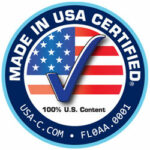January 31, 2011
Last week, the California Supreme Court ruled to protect the rights of consumers against companies that fraudulently advertise their products as “Made in the USA”, when in fact those products were manufactured in Mexico, with parts that came from Taiwan and Canada. Such was the case against Kwikset, who had shut down their US operations and moved to Mexico, yet still branded their products as “Made in the USA” and even put American flags on them!
Our company, MADE in USA CERTIFIED (www.usa-c.com) is doing the job of helping consumers everywhere to discover WHICH companies DO produce goods IN the United States; who buy their ingredients or components IN the United States; and who employ workers IN the United States. We have been actively uncovering many falsehoods that consumers would never suspect, and that is important. But our goal is to give a face to the many USA manufacturers, producers and service company that truly produce MADE in USA CERTIFIEDTM; PRODUCT of USA CERTIFIEDTM; or SERVICE of USA CERTIFIEDTM products or services. What’s more, these companies had the good sense to be CERTIFIED through our extensive third party, non partisan audit and certification process. Now, it’s about time that EVERY truly USA business GET this CERTIFICATION and we will help consumers everywhere know it… and support USA companies… helping the US economy and keeping jobs here in the United States! Contact us TODAY and we will help you!
January 27, 2011 08:31 PM Eastern Time
California Supreme Court Issues Major Pro-Consumer Ruling, Announces Robbins Geller Rudman & Dowd LLP
State’s Highest Court Reaffirms Protective Force of Unfair Competition Law and Holds Company Accountable for Illegal Deceptions in Highly Anticipated Kwikset Decision
SAN DIEGO–(BUSINESS WIRE)–In a victory for consumer rights, today the California Supreme Court sided with shoppers misled by a corporation that illegally advertised dozens of products as “Made in U.S.A.” after closing its California factory and shipping jobs to Mexico.
“If a corporation wants to close American manufacturing plants, shift American jobs to Mexico, and perform some of its most labor-intensive operations in foreign countries to save money, that may be legally permissible”
The Kwikset company had been found to have violated the Made in the USA statute, and the Court’s decision reinforced the ability of consumers to enforce the California Business and Professions Code statute’s express prohibition on false country of origin labels.
“This decision protects people who buy based on how products are prepared and brought to market, such as organic, kosher and Made in the USA,” said Jonathan Cuneo of Cuneo Gilbert & LaDuca, LLP, co-counsel for plaintiffs, who argued the case to the California Supreme Court.
Kwikset conducted manufacturing operations at a factory in Anaheim. It then decided to close the California factory, lay off California workers, and instead use a new plant in Mexicali. In addition to its Mexico plant, Kwikset imported parts from Taiwan. Other parts were shipped from Canada. Electronics were made in Malaysia.
Even with this foreign content, Kwikset continued to tout its products as “MADE IN U.S.A.,” “ALL AMERICAN MADE,” and “ALL AMERICAN MADE AND PROUD OF IT.” Kwikset also added American flag graphics to the packaging.
At its Mexico plant, Kwikset assembled thousands of latches a week. These latches, the guts of the locks, were sold as “MADE IN MEXICO.” However, when the same latches were installed in locks, the locks were advertised as “ALL AMERICAN MADE.”
The Court ruled that “plaintiffs who can truthfully allege they were deceived by a product’s label into spending money to purchase the product, and would not have purchased it otherwise, have ‘lost money or property’ . . . and have standing to sue.”
“If a corporation wants to close American manufacturing plants, shift American jobs to Mexico, and perform some of its most labor-intensive operations in foreign countries to save money, that may be legally permissible,” said co-counsel Pamela Parker of Robbins Geller Rudman & Dowd LLP. “However, that corporation does not then have the right to lie to consumers about the origins of its products in order to gain an unfair competitive advantage.”
This case is also a victory for the capital marketplace and businesses that play by the rules with honesty and integrity. If a company chooses to pay American wages, keep manufacturing jobs in America, and advertise its products as “Made in U.S.A.,” it should not have to compete with another company that is cutting costs using foreign labor but falsely making the same promotional claim. Markets are only truly free when consumers are given accurate and honest information about the products they purchase.

